General Ordinances - City of New Buffalo
General Ordinances - City of New Buffalo
General Ordinances - City of New Buffalo
Create successful ePaper yourself
Turn your PDF publications into a flip-book with our unique Google optimized e-Paper software.
CITY OF NEW BUFFALO<br />
CODE OF ORDINANCES<br />
10. Noxious or malodorous gas, such as but not limited to hydrogen sulfide, sulfur dioxide, or oxides <strong>of</strong><br />
nitrogen and other substances capable <strong>of</strong> producing a public nuisance shall not be allowed.<br />
11. pH less than five and a half (5.5) and greater than nine and a half (9.5) shall not be allowed.<br />
12. Radioactive wastes or isotopes <strong>of</strong> such half-life or concentration which may exceed limits established by<br />
applicable state and federal regulations, shall not be allowed.<br />
13. Suspended solids in excess <strong>of</strong> three-hundred fifty (350) mg/l.<br />
14. Temperature <strong>of</strong> wastes less than thirty-two (32) degrees Fahrenheit and greater than one-hundred fifty<br />
(150) degrees Fahrenheit shall not be allowed.<br />
15. Waters or wastes containing substances, which are not amenable to treatment, only to such degree that the<br />
sewage treatment plant effluent cannot meet the requirements <strong>of</strong> other agencies having jurisdiction over<br />
discharge to the receiving waters.<br />
D. If any waters or wastes are discharged or are proposed to be discharged to the public sewers, which waters<br />
contain the substances or possess the characteristics enumerated in subsection D <strong>of</strong> this Section, and which in<br />
the judgment <strong>of</strong> the District, may have deleterious effect upon the sewage works, processes, equipment, or<br />
receiving waters, or which otherwise create a hazard to life or constitute a public nuisance, the District may:<br />
1. Reject the wastes.<br />
2. Require pre-treatment to an acceptable condition for discharge to the public sewers.<br />
3. Require control over the quantities and rates <strong>of</strong> discharge.<br />
4. Require payment to cover the added cost <strong>of</strong> handling and treating the wastes not covered by existing taxes<br />
and/or sewer charges under the provisions <strong>of</strong> Section 16-9 <strong>of</strong> this Chapter.<br />
E. If the District permits the pre-treatment or equalization <strong>of</strong> waste flows, the design and installation <strong>of</strong> the plants<br />
and equipment shall be subject to the review and approval <strong>of</strong> the Superintendent and subject to the requirements<br />
<strong>of</strong> all applicable codes, ordinances, and laws.<br />
Grease, oil, and sand interceptors shall be provided when, in the judgment <strong>of</strong> the District, they are necessary for<br />
the proper handling <strong>of</strong> liquid wastes containing grease in excessive amounts or any flammable wastes, sand, or<br />
other harmful ingredients except that such interceptors shall not be required for private living quarters or<br />
dwelling units. All interceptors shall be <strong>of</strong> a type and capacity approved by the District, and accessible for<br />
cleaning and inspection.<br />
F. Where preliminary treatment or flow equalizing facilities are provided for any waters or wastes, they shall be<br />
maintained continuously in satisfactory and effective operation, by the owner at their expense.<br />
G. When required by the District, the owner <strong>of</strong> any property serviced by a building sewer carrying industrial<br />
wastes shall install a suitable control manhole together with such necessary meters and other appurtenances in<br />
the building sewer to facilitate observation, sampling, and measurement <strong>of</strong> the wastes. Such manhole, when<br />
required, shall be accessibly and safely located, and shall be constructed in accordance with plans approved by<br />
the Superintendent. The manhole shall be installed by the owner at his expense and shall be maintained by the<br />
owner so as to be safe and accessible at all times.<br />
H. All measurements, tests and analysis <strong>of</strong> the characteristics <strong>of</strong> waters and wastes to which reference is made in<br />
this Chapter shall be determined in accordance with the most recent edition <strong>of</strong> "Standard Methods for the<br />
Examination <strong>of</strong> Water and Sewage" and shall be determined at the control manhole provided for or upon<br />
suitable samples taken at said control manhole. In the event that no special manhole has been required, the<br />
control manhole shall be considered to be the nearest downstream manhole in the public sewer to the point at<br />
Chapter 16- SEWERS AND SEWAGE DISPOSAL 16-9



